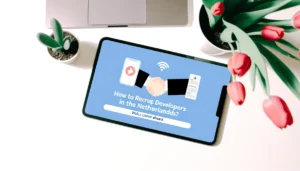How Mobile App Revolutionize your business in Netharlands?

In the heart of the Netherlands, a quiet revolution is unfolding. It’s not in the tulip fields or the bustling city squares, but within the digital landscape of business. It’s a change driven by something small enough to fit in your pocket yet big enough to revolutionize how we do business: mobile apps. In our neighbourhoods, from Amsterdam’s vibrant streets to the serene canals of Utrecht, mobile technology is not just a tool; it’s becoming the backbone of how businesses operate and thrive.
In this exploration, we’re diving deep into how mobile apps are redefining the very fabric of the Dutch business environment. From the tulip fields of the countryside to the bustling streets of Amsterdam, businesses are embracing app-driven solutions to stay ahead. But what exactly does this shift entail? How are various sectors leveraging mobile technology to not just survive but thrive? And crucially, what does it mean for your business?
We’re set to uncover the impact of mobile apps across diverse business sectors, highlighting how these digital tools enhance customer engagement and streamline operations. We’ll explore how apps are becoming powerful marketing allies and the role they play in facilitating data-driven decision-making. Join us as we navigate the challenges and considerations of this mobile app revolution, offering insights and strategies to harness its full potential. Whether you’re a startup owner in Rotterdam or a retail giant in The Hague, understanding the role of mobile apps in today’s business world is not just beneficial – it’s essential.
The Impact of Mobile Apps on Various Business Sectors:
In the Netherlands, the windmills of innovation are turning, and they’re powered by mobile apps. These apps are not just changing how we do business; they’re redefining entire sectors. Let’s take a closer look at how different industries are being transformed:
Retail Sector:
- Personalized Shopping Experiences: Retailers are using apps to offer personalized recommendations, based on customer preferences and purchase history.
- Mobile Commerce: The ease of shopping through an app has led to a surge in mobile commerce. Customers enjoy the convenience of browsing and buying products with just a few taps on their screens.
- In-Store Navigation: Some apps even help customers navigate through large stores, enhancing the in-store experience.
Service Industry:
- On-Demand Services: From food delivery to taxi services, mobile apps have made it easier for customers to access services on the go.
- Appointment Scheduling: Service providers like salons and clinics are using apps for hassle-free appointment bookings, reducing wait times and improving customer satisfaction.
E-commerce:
- Seamless Shopping Experience: E-commerce businesses are leveraging apps to provide a seamless shopping experience, integrating payment gateways for secure and quick transactions.
- Customer Feedback: These apps also offer a platform for customers to leave feedback, which businesses use to improve their services.
B2B Businesses:
- Streamlined Operations: Mobile apps help B2B businesses streamline operations, from inventory management to order processing.
- Enhanced Communication: They facilitate better communication and collaboration between businesses, leading to more efficient partnerships.
Each sector is witnessing its own revolution, thanks to sector-specific app impacts. But what does this mean for your business? It means there’s a world of opportunity waiting to be tapped into. Whether you’re in retail, offering personalized shopping experiences, or in the service industry, streamlining your appointment bookings, there’s a mobile solution that can elevate your business efficiency. In the heart of the Dutch business world, industry-specific mobile solutions are not just a trend; they’re becoming a necessity.
Enhancing Customer Engagement through Mobile Apps
In the Netherlands, where business is as much about innovation as it is about tradition, enhancing customer engagement has taken a front seat in the digital era. Mobile apps are at the heart of this transformation. Let’s explore how these apps are changing the way businesses interact with their customers:
User Experience:
- Simplicity and Accessibility: A user-friendly app design is key. It’s about creating an app that’s easy to navigate, making sure customers find what they need without any hassle.
- Personalization: Apps are now able to offer personalized experiences based on user behavior, preferences, and past interactions.
Customer Service:
- Instant Support: Mobile customer support, including live chat and in-app messaging, means help is just a tap away. This immediacy not only solves issues faster but also boosts customer satisfaction.
- Feedback Channels: Apps provide a direct line for customers to give feedback, making them feel heard and valued.
Brand Loyalty:
- Rewards and Incentives: Implementing loyalty programs within the app encourages repeat business. Exclusive offers and rewards make customers feel special and appreciated.
- Consistent Brand Experience: An app is an extension of your brand. A consistent look and feel across all platforms strengthen brand identity and loyalty.
Improving Customer Interaction:
- Engaging Content: Regular updates with engaging content keep customers coming back. Whether it’s informative blog posts or exciting new features, fresh content keeps the app dynamic.
- Interactive Features: Features like augmented reality or interactive tools can provide unique experiences that set your app apart.
Customer Retention:
- Regular Updates: Keeping the app updated with new features and improvements shows customers that you’re committed to providing a great experience.
- Incentives for Long-Term Use: Offering incentives for continued use of the app can help maintain a loyal user base.
In the bustling business environment of the Netherlands, where every customer interaction counts, mobile apps are not just a tool; they’re a necessity for building and maintaining strong customer relationships.
Streamlining Operations with Mobile Apps:
In the Netherlands, where the business landscape is as diverse as our tulip fields, streamlining operations is key to staying competitive. Mobile apps are playing a crucial role in this, transforming the way businesses manage their day-to-day activities. Let’s dive into how mobile apps are making operations smoother and more efficient:
Workflow Optimization:
- Centralized Communication: Mobile apps provide a platform for centralized communication, ensuring that everyone is on the same page, whether they’re in the office or out in the field.
- Task Management: With features for assigning and tracking tasks, apps help in keeping workflows organized and ensuring that deadlines are met.
Employee Productivity:
- Remote Access: Mobile apps allow employees to access work-related information and tools from anywhere, boosting productivity, especially for those who are on the move.
- Time Management Tools: Features like time tracking and scheduling help employees manage their time more effectively.
Operational Efficiency:
- Automated Processes: From inventory management to invoicing, many routine tasks can be automated through apps, reducing the time and effort required for these operations.
- Real-Time Data Access: Having real-time access to data helps in making quick, informed decisions, which is crucial for operational efficiency.
Operational Improvement:
- Feedback Loops: Apps can provide valuable insights into operational bottlenecks, allowing businesses to continuously improve their processes.
- Customizable Solutions: The beauty of mobile apps lies in their customizability, allowing businesses to tailor solutions to their specific operational needs.
Workflow Management:
- Project Tracking: Mobile apps offer tools for tracking the progress of projects, providing a clear overview of where things stand at any given moment.
- Collaboration Features: Enhanced collaboration features in apps help teams work together more effectively, no matter where they are.
Productivity Apps:
- Specialized Tools: There are apps designed for specific industries, offering tools that are tailored to the unique needs of those sectors.
- Integration Capabilities: Many apps can integrate with existing systems, creating a seamless workflow and reducing the need for multiple platforms.
Business Process Automation:
- Reducing Manual Work: Automation of routine tasks frees up time for employees to focus on more strategic activities.
- Error Reduction: Automated processes are less prone to errors, leading to more reliable operations.
In the dynamic world of Dutch business, where efficiency and adaptability are paramount, mobile apps are not just a luxury; they’re a necessity.
Mobile Apps as a Marketing Tool
In the vibrant business scene of the Netherlands, where bicycles line the streets and innovation drives the market, mobile apps have become a crucial tool in the marketing toolbox. Let’s explore how these apps are revolutionizing marketing strategies and helping businesses connect with their audience in more meaningful ways:
Digital Marketing:
- Direct Channel to Customers: Mobile apps provide a direct line to customers, allowing businesses to share updates, promotions, and new content right at their fingertips.
- Enhanced User Engagement: With interactive features, apps keep users engaged, increasing the time they spend with your brand.
Brand Promotion:
- Showcasing Products/Services: Apps offer a platform to showcase products and services in an interactive and visually appealing way.
- Storytelling: They allow businesses to tell their brand story in a more engaging and personal manner, building a deeper connection with customers.
Targeted Advertising:
- Personalized Offers: By analysing user data, apps can deliver personalized advertising and offers, making marketing efforts more effective.
- Location-Based Promotions: Businesses can use geo-targeting to send relevant promotions to users based on their location.
Customer Outreach:
- Push Notifications: These are a powerful tool for customer outreach, providing timely reminders and updates that encourage users to engage with the app.
- Social Sharing: Integration with social media platforms makes it easy for users to share their favorite products, deals, or app content, expanding your reach.
Marketing Strategies:
- Data-Driven Campaigns: The data collected through apps can inform and refine overall marketing strategies, ensuring they are targeted and effective.
- Experimentation and Adaptation: Apps allow for quick experimentation with marketing tactics and easy adaptation based on what works best.
Brand Awareness:
- Consistent Branding: Apps reinforce brand identity through consistent visual and interactive elements.
- Word of Mouth: A well-designed app can become a talking point among users, increasing brand awareness through word of mouth.
Mobile Advertising:
- Cost-Effective: Compared to traditional advertising, mobile advertising can be more cost-effective, offering a higher return on investment.
- Wide Reach: With the widespread use of smartphones, mobile advertising has the potential to reach a broad audience.
Customer Acquisition:
- First Impressions: A well-crafted app can make a strong first impression on potential customers, drawing them into your brand’s ecosystem.
- Incentives for Downloads: Offering incentives for downloading the app can be an effective way to acquire new customers.
In the bustling business environment of the Netherlands, where tulips and tech go hand in hand, mobile apps are not just a trend; they’re a transformative force in marketing.
Data-Driven Decision Making with Mobile Apps:
In the bustling markets and cozy cafés of the Netherlands, there’s a quiet revolution happening in the way businesses make decisions. It’s all thanks to mobile apps, which have become like the trusty bicycles of the digital world – essential, reliable, and getting us exactly where we need to be. Let’s pedal through how these apps are changing the game in data-driven decision making:
Understanding the Customer:
- What Do They Really Want?: By looking at how customers interact with our apps, we get a clear picture of their preferences and needs.
- When Do They Engage?: Analysing app usage times helps us understand the best times to launch new features or run promotions.
Making Sense of Numbers:
- Beyond the Data Jungle: It’s not just about collecting data; it’s about making sense of it. Mobile apps help us turn raw numbers into understandable insights.
- Spotting Trends: Is there a sudden spike in app usage on rainy days? Or do people shop more on weekends? These insights help tailor our business strategies.
Tailoring the Experience:
- Personalized Offers: Imagine knowing exactly what offers will excite your customers. That’s what data from mobile apps can tell us.
- Improving the App: Feedback and usage patterns show us what’s working and what’s not, so we can keep making the app better.
Decisions, Decisions:
- What’s the Next Big Thing?: Data helps us predict future trends. Maybe it’s time to introduce a new product line or service.
- Avoiding Pitfalls: Sometimes, what we learn helps us steer clear of potential mistakes – like investing in features that our customers might not use.
Getting the Word Out:
- Effective Marketing: With insights from our app, we know exactly who to target with our marketing and when.
- Building Relationships: It’s not just about selling; it’s about building lasting relationships. Data helps us understand how to keep our customers coming back.
In the Netherlands, where innovation meets practicality, mobile apps are more than just a tech trend. They’re a vital part of how we understand our market and make smart, informed decisions. For any Dutch business looking to stay ahead, diving into the world of data analytics through mobile apps isn’t just a good idea – it’s essential. It’s about connecting the dots, understanding the story behind the numbers, and cycling confidently into a future where decisions are not just guesses, but informed choices.
Wrapping It Up: As we wrap up our exploration of how mobile apps are revolutionizing businesses in the Netherlands, it’s clear that staying abreast of the latest digital tools is not just beneficial; it’s essential. These apps are more than just a trend; they are the engines driving efficiency and productivity in various sectors. From enhancing customer engagement to streamlining operations, and from bolstering marketing efforts to enabling data-driven decisions, mobile apps have proven to be invaluable. For Dutch businesses, the path forward is illuminated with the promise of innovation. Embracing mobile technology is not just about keeping pace; it’s about setting the pace, ensuring your business not only survives but thrives in the digital era.
Looking for a top-notch mobile app development company in the Netherlands? Mobilions stands out with its innovative, user-centric app designs. Our expertise in advanced technology delivers bespoke solutions that propel business growth and amplify user engagement in today’s digital landscape.


